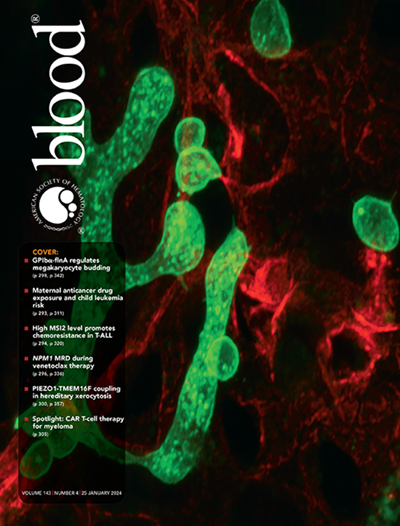Antibiotic-induced loss of gut microbiome metabolic output correlates with clinical responses to CAR T-cell therapy.
IF 21
1区 医学
Q1 HEMATOLOGY
引用次数: 0
Abstract
Antibiotic-induced microbiome dysbiosis is widespread in oncology, adversely affecting outcomes and side effects of various cancer treatments, including immune checkpoint inhibitors and chimeric antigen receptor T (CAR-T) cell therapies. In this study, we observed that prior exposure to broad-spectrum ABX with extended anaerobic coverage like piperacillin-tazobactam and meropenem was associated with worsened anti-CD19 CAR-T therapy survival outcomes in large B-cell lymphoma patients (n=422), compared to other ABX classes. In a discovery subset of these patients (n=67), we found that the use of these ABX was in turn associated with substantial dysbiosis of gut microbiome function, resulting in significant alterations of the gut and blood metabolome, including microbial effectors such as short-chain fatty acids (SCFAs) and other anionic metabolites, findings that were largely reproduced in an external validation cohort (n=58). Broader evaluation of circulating microbial metabolites revealed reductions in indole and cresol derivatives, as well as trimethylamine N-oxide, in patients who received ABX treatment (discovery n=40, validation n=28). These findings were recapitulated in an immune-competent CAR-T mouse model, where meropenem-induced dysbiosis led to a systemic dysmetabolome and decreased murine anti-CD19 CAR-T efficacy. Furthermore, we demonstrate that SCFAs can enhance the metabolic fitness of CAR-T cells, leading to improved tumor killing capacity. Together, these results suggest that broad-spectrum ABX deplete metabolically active commensals whose metabolites are essential for enhancing CAR-T efficacy, shedding light on the intricate relationship between ABX exposure, microbiome function and their impact on CAR-T cell efficacy. This highlights the potential for modulating the microbiome to augment CAR-T immunotherapy.抗生素引起的肠道微生物组代谢输出损失与 CAR T 细胞疗法的临床反应相关。
抗生素诱导的微生物组菌群失调在肿瘤学中非常普遍,对各种癌症治疗(包括免疫检查点抑制剂和嵌合抗原受体T(CAR-T)细胞疗法)的结果和副作用产生了不利影响。在这项研究中,我们观察到,与其他ABX类药物相比,大B细胞淋巴瘤患者(422人)之前接触过哌拉西林-他唑巴坦和美罗培南等具有扩大厌氧菌覆盖范围的广谱ABX与抗CD19 CAR-T疗法生存结果恶化有关。在这些患者的发现子集中(样本数=67),我们发现使用这些抗逆转录病毒药物反过来又与肠道微生物组功能的严重失调有关,导致肠道和血液代谢组的显著改变,包括微生物效应物,如短链脂肪酸(SCFA)和其他阴离子代谢物,这些发现在外部验证队列(样本数=58)中基本重现。对循环微生物代谢物进行的更广泛评估显示,接受ABX治疗的患者体内吲哚和甲酚衍生物以及三甲胺N-氧化物的含量均有所下降(发现人数=40,验证人数=28)。这些发现在免疫功能正常的 CAR-T 小鼠模型中得到了再现,在该模型中,美罗培南诱导的菌群失调导致全身代谢紊乱,降低了小鼠抗 CD19 CAR-T 的疗效。此外,我们还证明 SCFAs 能增强 CAR-T 细胞的代谢能力,从而提高肿瘤杀伤能力。这些结果共同表明,广谱 ABX 会消耗代谢活跃的共生菌,而这些共生菌的代谢产物对提高 CAR-T 疗效至关重要,从而揭示了 ABX 暴露、微生物组功能及其对 CAR-T 细胞疗效的影响之间错综复杂的关系。这凸显了调节微生物群以增强 CAR-T 免疫疗法的潜力。
本文章由计算机程序翻译,如有差异,请以英文原文为准。
求助全文
约1分钟内获得全文
求助全文
来源期刊

Blood
医学-血液学
CiteScore
23.60
自引率
3.90%
发文量
955
审稿时长
1 months
期刊介绍:
Blood, the official journal of the American Society of Hematology, published online and in print, provides an international forum for the publication of original articles describing basic laboratory, translational, and clinical investigations in hematology. Primary research articles will be published under the following scientific categories: Clinical Trials and Observations; Gene Therapy; Hematopoiesis and Stem Cells; Immunobiology and Immunotherapy scope; Myeloid Neoplasia; Lymphoid Neoplasia; Phagocytes, Granulocytes and Myelopoiesis; Platelets and Thrombopoiesis; Red Cells, Iron and Erythropoiesis; Thrombosis and Hemostasis; Transfusion Medicine; Transplantation; and Vascular Biology. Papers can be listed under more than one category as appropriate.
 求助内容:
求助内容: 应助结果提醒方式:
应助结果提醒方式:


